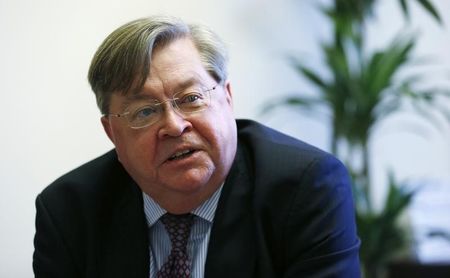By David Milliken
LONDON (Reuters) - Bank of England policymaker Ian McCafferty said that economic data over the next few months will have a critical influence on when the central bank raises interest rates, adding to signs that a rate rise is possible later this year.
McCafferty's comments on monetary policy in a speech in London on Thursday largely echo those he gave in a radio interview 10 days ago, and follow BoE Governor Mark Carney's warning last week that markets had underpriced the risk of an early rate rise.
"The decision on when it will become appropriate to begin the normalisation of policy is becoming more balanced as the economy has strengthened through the early summer," he said.
"As ever, our decisions on monetary policy will depend critically on the evolution of the data over the coming months."
McCafferty also discussed Britain's weak productivity at length, a key issue for monetary policy as it is likely to generate inflation pressures if it does not start to recover as growth strengthens.
Most of the weakness in productivity appeared to be related to factors that would not improve as the economy recovered, such as increased regulation and a long-term decline in easily accessible North Sea oil reserves, he concluded.
"Some of the weakness may well be more persistent, and that a more rapid recovery in productivity than currently expected over the next couple of years is perhaps hoping for too much," he said.
McCafferty stressed that he did not want interest rates to rise rapidly, and that increasing rates earlier rather than later was one way to do this, describing it as "an additional reason not to hold back too long".
"It will be critically important that rises in Bank Rate are delivered, as far as we are able, at only a modest, gradual pace," he said.
How widely McCafferty's views are shared on the MPC is not completely clear. Only a minority of policymakers at June's MPC meeting shared his view that the case for rate rises is becoming more balanced - although that does include Carney and new chief economist Andy Haldane.
Haldane said late on Wednesday that it would be better for the BoE to be on the front foot and take a proactive stance on raising rates.
New BoE policymaker Kristin Forbes, who starts next month, also highlighted costs to waiting too long to raise rates in her first testimony to British lawmakers on Wednesday.

But Martin Weale, probably the most hawkish member of the MPC, said in a radio interview earlier broadcast on Thursday that there was no case for an immediate rate rise.
And the minutes showed that all policymakers thought the economy could grow further before rates needed to go up, with wage growth weak and inflation below target and subsequently hitting a 4-1/2 year low.
(Reporting by David Milliken; Editing by Hugh Lawson)
